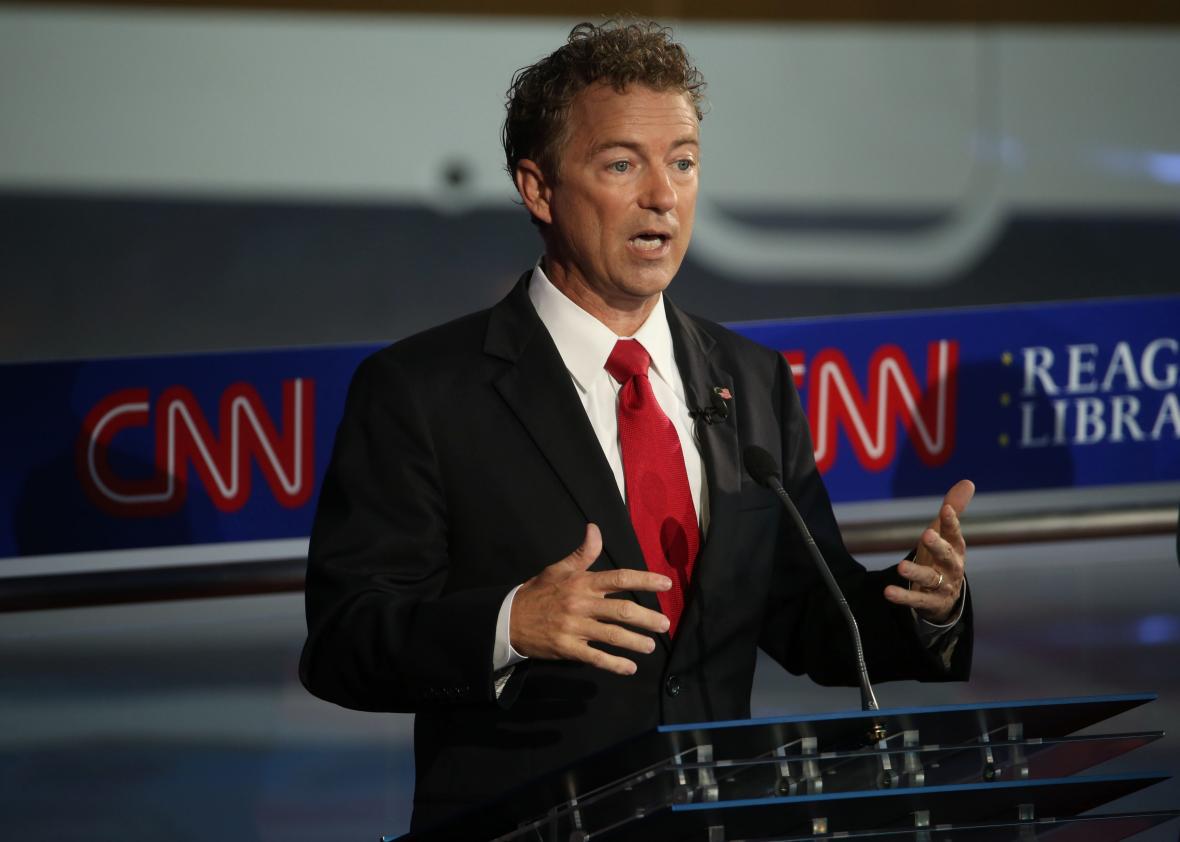It’s a strange debate where Sen. Rand Paul comes off as the most sensible contender on the stage.
The shockwaves sounded three times during the GOP debate’s testy phase on foreign policy Wednesday night. First, after Carly Fiorina said she wouldn’t so much as meet with Russian President Vladimir Putin for the evils he’s committed, Paul noted that Ronald Reagan—in whose library the candidates and their audience were gathered—talked with the Russians throughout the Cold War, to the world’s benefit.
Second, after hearing his rivals blast President Obama for not bombing Syria two years ago after pledging that he would if President Bashar al-Assad crossed the “red line” of using chemical weapons, Paul said, “If we’d bombed Syria, ISIS would be in Damascus today,” adding, “Sometimes intervention makes us less safe.” The specific claim is debatable (though no one debated it), but the broad point is indisputably true.
Third, contrary to almost all of his rivals (and his fellow Republicans on Capitol Hill), Paul said that he would not “tear up” the Iran nuclear deal upon entering the White House. “Let’s see if the Iranians comply with it,” he said, in a tone suggesting that he was making an obvious point—which, indeed, he was.
Two other candidates joined Paul on this last point, sort of. Jeb Bush said, “Tearing up the Iran deal doesn’t do anything.” Ohio Gov. John Kasich seemed to split from the party line that Obama naively trusts Ayatollah Khamenei, saying, with some exasperation, that nobody is trusting the Iranians: If they cheat, we’ll take action. Meanwhile, he said, we need to stay unified with the allies, “not just go it alone.”
Otherwise, when foreign policy came up, it was another evening of folly and vagueness.
Donald Trump once more proved himself out of his element. On what to do about Assad and ISIS: “Let them fight each other and [we’ll] pick up the remnants”—as if we’d be in any position to pick up remnants. On Russia: “I will get along, I think, with Putin … and we’ll have a more stable world”—seemingly thinking that the world’s problems can be solved simply by talking about them with bonhomie and steel-eyed stares over brandy and cigars. Later in the debate, he admitted that he in fact didn’t know much about the topic. “I’m not sitting in the Senate, I am a businessman doing business transactions,” but, by the time he sits in the Oval Office, he claimed, “I will know more about the problems of the world.”
Wisconsin Gov. Scott Walker bellowed that, given China’s “massive cyberattack” against the United States, Obama should cancel his upcoming state dinner with President Xi Jinping. China is behind some of the most blatant cyber-intrusions, and Obama is making an issue of them. But this is an awkward issue: China’s largest cyber-offensive—the pilfering of U.S. government personnel records—wasn’t an attack but rather an intelligence operation, similar to cyber-intelligence operations that we and other Western nations have conducted. Meanwhile, Walker offered no ideas on what to do about cybersecurity.
Fiorina said that, on Day One of her presidency, she would call Iran’s supreme leader, Khamenei, and tell him he needs to allow anytime-anywhere inspection of all his nation’s military facilities or she would block the movement of his money around the world. That would send the message, she said, that “the United States of America is back in the leadership business.”
First, no American has ever spoken with the Ayatollah. Second, no nation would allow foreign inspectors to enter any and all military facilities without notice and at will. Third, tearing up an accord that the United States negotiated alongside five close allies—whose leaders strongly endorse the results and say they won’t go back and renegotiate its terms—doesn’t augur well for leadership.
Sen. Ted Cruz didn’t talk much, but when he did, he proved himself either the most ill-informed or most deceptive on the lot. He repeated the two most discredited shibboleths about the Iran nuclear deal: that the deal gives Iran 24 days to let inspectors into facilities, enough time to hide nuclear activities (wrong on both counts), and that it lets the Iranians inspect themselves (again, wrong).
Sen. Marco Rubio made the claim, to feisty applause, that President Obama is “more respectful to the Ayatollah of Iran than to the prime minister of Israel.” Does he really believe this? Even after getting thoroughly dissed and undermined by Benjamin Netanyahu, Obama will continue to provide Israel with more security assistance than any other American president in recent history—and, even after the nuclear deal, will sustain sanctions against Iran for its support of terrorist organizations.
Rubio did recite some dangerous developments in the world, and with greater fluency than any of the other contenders in the main debate—the rise of China’s navy, the spread of ISIS, North Korea’s nuclear bomb. But does he really believe that the world is more dangerous than at any time in recent memory or that Obama is “eviscerating the military” (which continues to match the spending of the militaries in every other major nation of the world, combined)?
Finally, what does he propose doing about these problems, besides growling more loudly, clenching his fist more tightly, and canceling the state dinner with China? It’s a question that none of the Republican candidates addressed.
See more of Slate’s coverage of the 2016 campaign.
